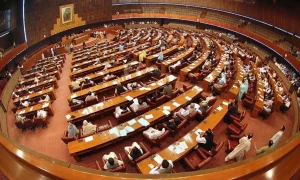Government Agrees to JUI-F’s Demands on Chief Justice Extension, ‘Constitutional Package’ Moves Forward
The government has agreed to Jamiat Ulema-e-Islam-Fazl (JUI-F) leader Maulana Fazlur Rehman’s demand not to extend the term of Chief Justice Qazi Faez Isa, sources revealed. As the “Constitutional Package” prepares for debate in Parliament on Sunday, members from both the treasury and opposition benches are actively seeking support from Fazl.
The proposed legislation, which aims to set a three-year tenure for the Chief Justice, requires 224 votes in the National Assembly to pass. Currently, the ruling coalition is short of 12 votes. If JUI-F supports the bill, the government will still need four to five additional votes to secure a majority.
Prime Minister Shehbaz Sharif has urged Pakistan Muslim League-Nawaz (PML-N) lawmakers and coalition partners to ensure their attendance for tomorrow’s session, as revealed during a dinner hosted for MPs in Islamabad.
In response to the government’s legislative push, Imran Khan’s party has also engaged with other opposition groups to strategize against the proposed changes. The amendment was initially scheduled to be tabled on Saturday but has been postponed by a day.
Sources have confirmed that the government has accepted Fazl’s condition to forgo any extensions for the Chief Justice, reaffirming the decision not to increase the retirement age for Supreme Court judges. This decision was made during a meeting between Law Minister Azam Nazeer Tarar and Fazl.
The government is also proposing amendments to establish a constitutional court, with the Chief Justice appointed from among the Supreme Court judges. The amendment will include a process where a panel of five senior judges is presented to the government for the Chief Justice position, with the government making the final appointment.
Additional changes will include provisions for the appointment of high court judges across the country, removing the requirement for consultations with the relevant judge.
Legislative Goals and Numbers
The proposed constitutional amendment aims to raise the retirement age for Supreme Court judges to 68 and for high court judges to 65, while also extending the Chief Justice’s term by three years. In case of resignation, the next senior judge would be appointed for a three-year term.
To pass this significant amendment, the government needs a two-thirds majority in the National Assembly, equating to 224 votes out of 336. Currently, there are 312 members present in the assembly, with 24 seats either disputed or vacant.
The government’s current strength stands at 213 members, including 111 from PML-N, 68 from Pakistan Peoples Party (PPP), 22 from Muttahida Qaumi Movement-Pakistan (MQM-P), and several others.
If JUI-F joins, the government’s support could rise to 222 members, leaving the need to persuade just two independent members. Sources suggest that the ruling coalition is confident of securing the necessary votes, with some members from the Sunni Ittehad Council and former FATA expected to support the amendment.
Political Developments
Prime Minister Shehbaz Sharif recently hosted a dinner for lawmakers, emphasizing the need for stability and urging members to stay in Islamabad to ensure participation in the upcoming session. He underscored that resolving the nation’s economic and political challenges is a top priority.
Meanwhile, the opposition, led by PTI, held an emergency parliamentary party meeting to discuss strategy against the constitutional amendment, with consultations ongoing with other opposition parties.
The political landscape remains dynamic as the “Constitutional Package” heads for critical parliamentary consideration.
Reducing Pension Expenses: Law Minister Discusses CJP Tenure Extension on Spotlight
In an appearance on Spotlight with Munizae Jahangir, Law Minister Azam Nazeer Tarar addressed the proposed constitutional package to extend the Chief Justice of Pakistan’s (CJP) tenure. Tarar revealed that during a meeting at the end of April, CJP Qazi Faez Isa had inquired about this extension. Isa expressed that while he believed extending the CJP’s term was a matter for Parliament to decide, he did not support such an amendment.
Tarar assured Isa that there were no current plans for such an extension but acknowledged the government’s concerns regarding the appointment and retirement of judges. The CJP recommended consulting Senior Puisne Judge Justice Mansoor Ali Shah, who affirmed that such decisions were indeed within Parliament’s purview and offered to assist with any legal developments.
Tarar added that the proposed changes aimed to address the country’s financial concerns by reducing the pension expenses associated with judicial retirements.










